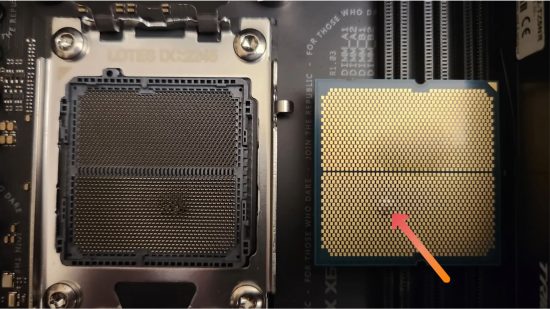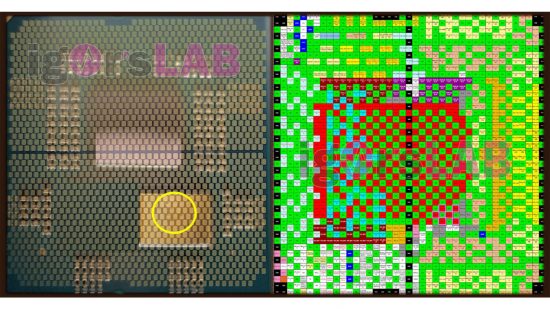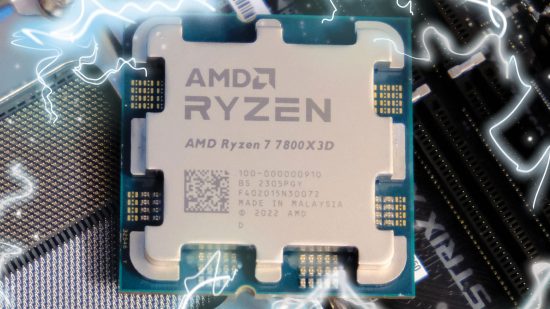Following reports last week (late April 2023), of AMD CPU overheating problems, AMD has now pinpointed the culprit and issued a firmware update that fixes it. The overheating problem was most widely reported as affecting the AMD Ryzen 7000X3D range, such as the AMD Ryzen 7800X3D, but also affected other Ryzen 7000 processors, so those running such chips should aim to update to the new firmware as soon as possible by downloading the latest BIOS/EFI for their motherboard.
The AMD overheating problem is rare but not a one-off, so here’s what you need to know.
The issue stems from too high a voltage being delivered to the chip, causing components to toast themselves. While this voltage wasn’t reached by most users in most circumstances, the automatic overclocking and voltage management of the chip could sometimes reach these dangerous levels.
The fix, then, is a new firmware (known as an AGESA or AMD Generic Encapsulated Software Architecture) that has been distributed to motherboard manufacturers for them to implement into their motherboard BIOS/EFI updates. This update limits the SoC (system on a chip) voltage to a maximum of 1.3V.
Despite the locking down of at least one potential element used in overclocking, AMD confirms that the new AGESA still allows for memory overclocking including using AMD EXPO or Intel XMP memory profiles. The chip will also still perform its automatic overclocking via Precision Boost but with this new hard limit to total chip voltage.
A statement from AMD reads:
We have root caused the issue and have already distributed a new AGESA that puts measures in place on certain power rails on AM5 motherboards to prevent the CPU from operating beyond its specification limits, including a cap on SOC voltage at 1.3V. None of these changes affect the ability of our Ryzen 7000 Series processors to overclock memory using EXPO or XMP kits or boost performance using PBO technology.
We expect all of our ODM partners to release new BIOS for their AM5 boards over the next few days. We recommend all users to check their motherboard manufacturers website and update their BIOS to ensure their system has the most up to date software for their processor.
Anyone whose CPU may have been impacted by this issue should contact AMD customer support. Our customer service team is aware of the situation and prioritizing these cases.
— AMD
Anyone that was affected by the issue should contact AMD support, although the company hasn’t specifically stated they will replace any affected chips as yet. Likewise, it’s not yet clear if any motherboards that were also damaged by the overheating and bulging CPUs will be replaced en masse, despite AMD and its board partners stepping in to replace some of the isolated incidents so far.
Throughout the problem, we still continued to recommend the AMD Ryzen 7 7800X3D and other Ryzen 7000 CPUs on our best gaming CPU list, as the incident rate appeared to be rare enough to be a niche concern. With the issue now fixed we can again wholeheartedly recommend the chip.
What was the AMD Ryzen 7000 overheating problem?
Reports of the Ryzen 7 7800X3D failing and users finding bulging spots on the underside of the processor appeared in late April 2023. The images shared online showed a bulge on the underside of the processor along with a corresponding dent in the motherboard socket pins.
Thanks to some rapid detective work by the likes of Igor’s LAB and Der8auer, the issue was quickly traced to the use of automatic overvolting techniques and particularly the use of AMD EXPO automatic memory overclocking, with the voltage controller suspected to be the culprit.

A small bulge in the CPU’s PCB can damage the CPU and your motherboard – Image source: Der8auer.
The issue was most prevalent on X3D chips but was also seen on some non-X3D CPUs. The issue was also reported most frequently in Asus motherboards, though given the company’s large market share, this could just be due to the wide use of its boards.
The initial response from AMD and its motherboard partners was to recommend users update their motherboards to the latest BIOS/EFI that either disables CPU overvolting options for X3D chips or implements improved thermal monitoring. Users were also told to consider turning off any overvolting settings and EXPO memory overclocking on existing BIOS/EFI.

Igor’sLAB traced the issues to the voltage controller by mapping the pin layout to the chip layout – Image source: Igor’sLAB
Asus also issued the following statement regarding its motherboards and efforts to fix the issue:
The EFI updates posted on Friday contain some dedicated thermal monitoring mechanisms we’ve implemented to help protect the boards and CPUs. We removed older BIOSes for that reason and also because manual Vcore control was available on previous builds. We’re also working with AMD on defining new rules for AMD Expo and SoC voltage. We’ll issue new updates for that ASAP. Please bear with us.
– Rajinder Gill, Asus

Above: Watch Der8auer explain the AMD overheating problems in more detail.
Were you concerned about these overheating issues or did you experience the problem yourself, and does the new fix reassure you? Let us know your thoughts on the Custom PC Facebook or Twitter pages, or join the discussion on our 375,000+ member Custom PC and Gaming Setup Facebook group.
